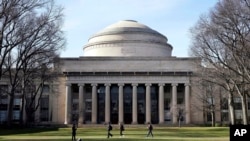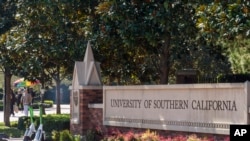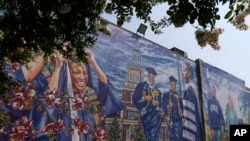Student Union
Academics Look to Restore Integrity to Science, Research
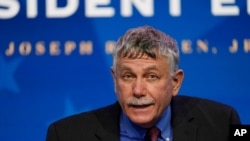
Since taking office in January, President Joe Biden has reaffirmed a national commitment to integrity in scholarship and research, appointing scientists to numerous leadership roles.
Educators and experts applaud these appointments and say elevating intellectual integrity in research and science will take the combined effort of universities, industry and the public, too.
Biden appointed Eric Lander -- who in 2001 was the first author on a paper published in the science journal Nature that heralded human genome sequencing -- to be the head of the Office of Science and Technology Policy (OSTP). Biden elevated the post to Cabinet-level status for the first time.
“How can we address stresses on academic research labs and promote creative models for federal research support?” the president asked in his January 15 letter announcing Lander’s appointment.
Some experts say that with the change in the presidential administration in the U.S., this is a moment for academia and research to review its standards, particularly given that the validity of science is sometimes questioned.
“Many Americans view scientific fact as fake news, aimed at furthering a liberal progressive agenda,” Lynn Pasquerella, president of the Association of American Colleges and Universities, told VOA. “Higher education, now more than ever, needs to be a visible force in the communities we seek to serve, demonstrating our relevance to the everyday concerns of people within those communities.”
Earl Lewis, professor of history, Afromerican and African studies at the University of Michigan, and founding director of the university’s Center for Social Solutions, said he addresses suspicions about higher education by asking skeptics if they prefer the doctor who finished first in their graduating class or the one who finished last.
“No one raises their hand” for the last in the class, Lewis said. “And I say, ‘So you do value education.’ Why is it that some of us who have been in higher education are viewed as part of the enemy class, rather than the class that can provide solutions to the problems that we all face?”
For Ivan Oransky, who is co-founder of the website Retraction Watch, the lack of quality scholarship in publishing research and reporting errors is part of the problem. Retractions are part of the solution, reporting information in published work “that is no longer reliable,” describing it as “the sort of nuclear option of correction in, in science or in academia, writ large, he told VOA.
“How willing are researchers, journals, universities, funding agencies willing to actually correct the record and actually talk about it?” Oransky asked.
But not correcting the record leads to more mistrust of data, Oransky said, and that includes scientific journals as well as the general press that reports discoveries of mass public impact.
“When I look at a news website, I'm actually much more likely to trust them if I see corrections running,” he said. “Look at how much information is coursing through that news website. You would expect some percentage of it to just be an error, not because people tried to make a mistake, but that we're humans, we make mistakes.
“If I'm reading a website, I see that they've never published a correction, I run the other way,” he said.
Rohin Francis, a British cardiologist, said that a kind of overzealousness has had a hand in the erosion of the public’s trust of scholarship and education. He calls those who may mean well but fall short of accuracy in social media posts and memes, the “Yay Science!” crowd.
“I'm a cheerleader for science myself,” he said on his Medlife Crisis YouTube channel, “but I'm fully aware of the complex way we make progress, the missteps, the human biases that are superimposed on discovery and implementation, the corruption, and just the highly erratic quality of published material. Science is a messy business.”
Speaking at a video news event January 14 for the Center for Strategic and International Studies, Norman Augustine, former chief executive of Lockheed Martin, called scientific research “critically important to the future quality of life in America, and to America’s position in the world.”
But “research is being badly underprioritized” in the U.S., while other nations like China are moving forward, he said.
Augustine quoted former Chinese Premier Wen Jiabao in China’s pursuit of technological supremacy.
“The history of modernization is in essence a history of scientific and technological progress. Scientific discovery and technological inventions have brought about new civilizations, modern industries and the rise and fall of nations. I firmly believe that science is the ultimate revolution,” Augustine said, quoting Jiabao.
“China sets goals for science,” Augustine said. “Furthermore, they meet those goals. … China has already passed the U.S. in terms of the number of doctoral degrees it awards in science and engineering. Furthermore, 19% of the baccalaureate degrees awarded in America are awarded in STEM -- science, technology, engineering and mathematics.”
“In China, over half are awarded in those fields,” he said.
The U.S., however, “certainly can compete in innovation, do our research with higher efficiency, factors like that,” he added.
See all News Updates of the Day
Malaysian official: Schools can’t turn away from global tensions
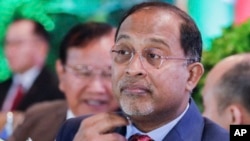
Zambry Abdul Kadir, Malaysia’s higher education minister, said protests spreading across universities in the United States show that schools can’t ignore political tensions.
Helen Packer, reporting in Times Higher Education, said the minister reminded educators that universities are key in the development of leaders, individuals and societies. (April 2024)
Social media breaks are difficult, but necessary

Between online classes, maintaining social connections and working on projects, college students can have a hard time disengaging from the demands of technology.
In Florida International University’s PantherNOW, Ariana Rodriguez offers strategies for taking a break from social media. (April 2024)
- By Melos Ambaye
Many master's degrees aren't worth the investment, research shows
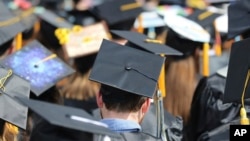
Nearly half of master's degrees have a negative financial return, according to new research by the Foundation for Research on Equal Opportunity, an economic research organization.
The study indicates that many graduate degree programs do not increase lifetime earnings enough to be worth it.
While 23% of bachelor’s degree programs yield a negative financial return on investment, 43% of two-year degrees and master’s degrees fail to deliver a return, according to the study by Preston Cooper, a senior fellow at FREOPP.
Cooper assessed the return on investment for 53,000 degree and certificate programs to determine whether a student’s lifetime earnings outweigh program costs and the risk of not completing their degree.
His findings show that a student’s field of study was the overriding indicator of return on investment at the undergraduate and graduate level.
Engineering, computer science and nursing bachelor’s degrees have high financial returns on investment, while programs in education, fine arts, psychology and English usually have low returns.
Graduate degrees in medicine and law tend to have strong payoffs. But a large share of master’s programs, including the MBA, frequently have low payoffs, according to Cooper.
Although workers with master’s degrees earn 16% more than those with only bachelor’s degrees, Cooper says the figure fails to account for students who had “higher preexisting earnings potential.”
“MBA students typically have high preexisting earnings potential, having often chosen high-ROI undergraduate majors such as finance and economics,” Cooper writes. “So the MBA adds little value on top of that.”
The study indicates that high starting salaries are predictors of high returns on investment. Degrees with starting salaries of $57,000 a year or more deliver the best lifetime returns.
But the return on investment of a degree can vary depending on the educational institution.
“Students interested in fields with low average pay can still find some schools that do well transforming those fields of study into high-paying careers,” Cooper writes.
The quality of an institution also matters, said William Tierney, professor emeritus of higher education at the University of Southern California.
“An MBA from Harvard is a likely ticket to a good job,” Tierney told VOA. “An MBA from the University of Phoenix, less so.”
But students pursue graduate programs for more than just financial reasons.
“Some degrees open up careers in fields that students may enjoy, such as in the performing arts,” Robert Kelchen, head of educational leadership at the University of Tennessee, Knoxville, told VOA.
“Others can help gain access to social networks or simply help students learn about a topic that is of interest,” Kelchen added.
Cooper told VOA that it might make sense for students in degree programs with low returns on investment to switch majors if they can still graduate on time.
He found the worst outcome for a student’s return on investment is dropping out of college “because they must pay for one or more years’ tuition and spend time out of the labor force.”
Lawmakers who fund higher education have a responsibility in ensuring “higher education delivers on its promise of economic mobility,” Cooper said.
Nearly a third of federal funding, including Pell grants and student loans, pays for higher education programs that fail to provide students with a return on investment, according to the study.
Cooper’s view is that “some schools should shut down low-ROI programs and reallocate institutional resources to programs with a better return.”
“There's definitely this narrative out there that higher education is always worth it, and you should always try to get that extra degree because it will increase your earnings,” he told VOA. “That's reinforced by colleges who make lofty promises regarding their graduate degree programs' outcomes, which all too often fall short.”
Harvard students end protest as school agrees to discuss Gaza conflict
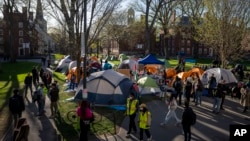
Protesters against the war between Israel and Hamas were voluntarily taking down their tents in Harvard Yard on Tuesday after university officials agreed to discuss their questions about the endowment, bringing a peaceful end to the kinds of demonstrations that were broken up by police on other campuses.
The student protest group Harvard Out of Occupied Palestine said in a statement that the encampment "outlasted its utility with respect to our demands." Meanwhile, Harvard University interim President Alan Garber agreed to pursue a meeting between protesters and university officials regarding the students' questions.
Students at many college campuses this spring set up similar encampments, calling for their schools to cut ties with Israel and businesses that support it.
The Israel-Hamas war began when Hamas and other militants stormed into southern Israel on October 7, killing some 1,200 people and taking 250 hostages. Palestinian militants still hold about 100 captives, and Israel's military has killed more than 35,000 people in Gaza, according to Gaza's Health Ministry, which doesn't distinguish between civilians and combatants.
Harvard said its president and the dean of the Faculty of Arts and Sciences, Hopi Hoekstra, will meet with the protesters to discuss the conflict in the Middle East.
The protesters said they worked out an agreement to meet with university officials, including the Harvard Management Company, which oversees the world's largest academic endowment, valued at about $50 billion.
The protesters' statement said the students will set an agenda that includes discussions on disclosure, divestment, reinvestment and the creation of a Center for Palestine Studies. The students also said that Harvard has offered to retract suspensions of more than 20 students and student workers and back down on disciplinary measures faced by 60 more.
"Since its establishment three weeks ago, the encampment has both broadened and deepened Palestine solidarity organizing on campus," a spokesperson for the protesters said. "It has moved the needle on disclosure and divestment at Harvard."
Chinese students report interrogations, deportations at US airports
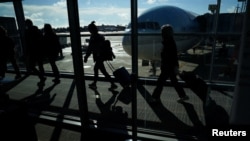
Academics from China are reporting increased scrutiny at U.S. airports, with valid visa holders being interrogated and turned away by Customs and Border Protection Agents.
Phones and laptops have been searched, and researchers have undergone extensive questioning about their work. One graduate student at Yale, who was midway through her PhD, was turned back at Dulles airport and banned from entering the U.S. for five years, according to The Guardian.




